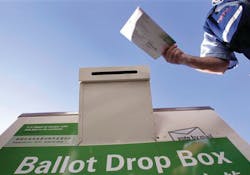Fire Departments Fared Well in Elections
Generally, however, it fared well.
Firefighters in California are rejoicing at the election and return of Gov. Jerry Brown to the State House. Brown was governor from 1975 to 1983 and has a 40 year track record of standing up for firefighters and first responders. He also signed the nation's first firefighter cancer presumption law.
It's a different story on the East Coast where providers are lamenting the defeat of a referendum that would have allowed the county to continue billing residents for emergency transport services.
Back on the West Coast, firefighters watched Proposition D go down in flames meaning that at least 60 firefighters will be cut from the San Diego Fire Department.
The good, the bad and the ugly also played out in the middle of the country with voters in Danville County, Ill. rejecting a measure to bond $360,000 for a new Sidell Fire Department station.
In Ohio, voters in three Sandusky County townships passed modest tax increases to support fire protection, but voters less than 150 miles away in Xenia overwhelmingly rejected a firefighter minimum staffing level.
That community, by a vote of 68 percent to 33 percent said no a proposal to mandate no fewer than 42 certified firefighters as well as other language about how personnel would be used.
Moving south to Colbert County, Ala., firefighters got some good news as voters approved an increase in the fire fee by a 20 percent margin. The special amendment increases the fee from $30 to $50 annually. The fee is added to the property tax of residents who live outside the city limits of Muscle Shoals, Tuscumbia and Sheffield.
There was also good news in Grand Blanc, Mich., where voters approved a 10-year levy to fund the fire department that serves both the city and the township. The increase almost doubles the fire department budget of $734,000 and will be used to keep up with state-mandated equipment costs and to hire three full-time firefighters.
In Georgia, by slightly more than five percent, voters across the state defeated a proposal to add $10 to car registration fees to boost trauma care funding.
Amendment 2, if it had passed, was expected to generate $80 million for specialized, extra-staffed hospitals and emergency responders for people seriously hurt in auto wrecks and workplace accidents.
Moving a little further west to Texas, voters in Melrose and Woden defeated measures to create Emergency Service Districts that would allow the communities to raise money for fire and ambulance protection.
The negative vote was 2 to 1 and the communities are now faced with the prospects of scaling back services or completely shutting down their emergency services departments.
It was a different story in Jackson, Mo., where voters passed a quarter-cent sales taxes for fire department operations, including a second fire station. The new sales tax will be 6.75 percent as the voters approved the new rate at an almost 2 to 1 margin.
Firefighters in Carlisle, Ohio will be going shopping for new turnout gear since voters in that community approved a tax increase of slightly more than $21 annually for owners of property with a value of $130,000.
The levy will generate an additional $36,000 annually with $27,000 a year going to the fire department's $118,000 annual budget.
While money wasn't the direct issue for firefighters in Palo Alto, Calif., control and authority was -- and voters turned back an effort to change that direction.
By a nearly 75 percent margin, voters said no to Measure R, a proposal the Palo Alto firefighters put forward that would have given voters more say over department staffing. It was designed to require two public hearings and a citywide election to close fire stations or reduce staffing.
City leaders opposed the measure saying it would have made the department essentially immune from reductions. The city's one-year budget cycle would have made it impossible to put any reduction initiatives on the ballot in a timely fashion.
Also in California, Bakersfield voters approved a pension reform measure designed to limit retirement benefits for firefighters and police officers hired in January.
Their benefits will be determined by using an old formula used by the Bakersfield City Council before the members sweetened the deal in 2001.
So upset by the passage, Bakersfield public servants are considering a lawsuit to bar implementation of the so called Measure D.
Firefighters in Warren County, Ohio, fared better, however, with voters in Wayne Township approving a five-year increase in the tax levy that will raise about $484,000 for the town's fire department. The money from will be used to improve the department's day-to-day operations and help with growth in the area.
Also in Ohio, voters in Delaware squeaked out passage of an income-tax increase to pay for new stations, new equipment and more firefighters. By a vote of 4,268 to 4,106, voters gave the nod to a 0.3 percent permanent income tax. It's expected to raise $3 million annually for possibly two new stations to help reduce response times and up to 18 additional firefighters.
And, back in California, firefighters with the Stockton Fire Department had their wings clipped when voters approved Measure H stripping some of the firefighters' union powers away.
Measure H eliminates the requirement that contract disputes be decided by outside arbitrators. It also removed a provision mandating the city hire the fire chief from within the ranks.
